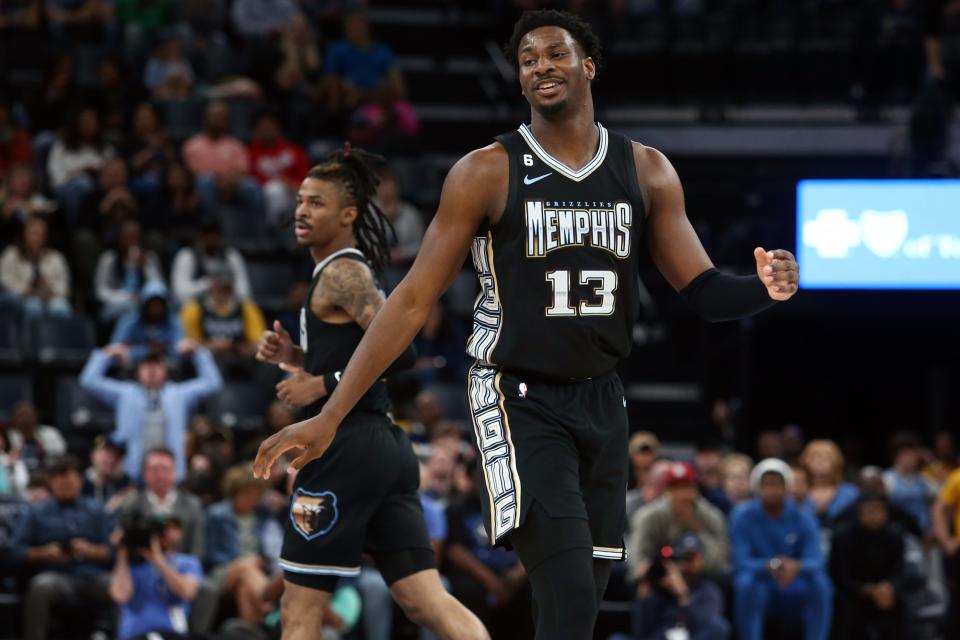How NBA's new CBA impacts the future of the Memphis Grizzlies — and Dillon Brooks trade

The financial future of the Memphis Grizzlies will look different in the next few years than at any point in franchise history because of the latest changes to the NBA’s collective bargaining agreement.
The Grizzlies have built their foundation on strong picks in the NBA draft, and the paydays have been trickling in player by player as a result. Big man Jaren Jackson Jr., star point guard Ja Morant and guard Desmond Bane have all been extended to nine-figure contract deals in the past three years. Brandon Clarke, Steven Adams and John Konchar also received contract extensions.
Memphis never has put this amount of money into a core group of players. Those decisions will set the foundation for how the Grizzlies compete in the Western Conference during the coming seasons.
The NBA’s new collective bargaining agreement went into effect July 1, and it includes 676 pages of information relevant to players. Some of the changes stand out as notable decisions that could impact Memphis' future.
Understanding the luxury tax aprons
With Morant and Bane set to earn max salaries and Jackson himself taking up almost 20% of the cap space, the Grizzlies likely will begin the 2024-25 season operating in the luxury tax, which is designed to restrict teams that overspend through fees and penalties. Bane’s extension doesn’t kick in until next year, so he’s still on his rookie deal for the upcoming season. Memphis is also paying Clarke, Adams, Luke Kennard and recent trade acquisition Marcus Smart salaries north of $10 million in 2023-24.
The salary cap for 2023-24 is set at $136.021 million, and the luxury tax level is $165.294 million. After exceeding the initial luxury tax level, penalties begin increase with each apron level a team reaches. The first apron level is $172.346 million, then the second is $182.794 million. According to Spotrac, Memphis is projected to fall more than $21 million below the luxury tax for the upcoming season, with $143 million in taxable salaries. But it might get dicey after that.
Memphis likely will exceed the luxury tax in 2024-25 when Bane's extension kicks in. The CBA had a clear message for teams committing megasalaries to players: the more a team spends over the salary cap, the hasher the restrictions. Teams in the second apron, for instance, receive the harshest restrictions, including potential draft pick penalties and trade limitations.
If the Grizzlies surpass the first apron, they will not be allowed to use the non-taxpayer mid-level exception, which is $12.045 million for the upcoming season (it could increase by 2024-25). The Grizzlies could still have access to the taxpayer mid-level exception ($5 million in 2023-24), but that again becomes outlawed when a team reaches the second apron.
Future contract extensions
Morant and Bane inked five-year max contract extensions, but the Grizzlies got Jackson on what now looks like a team-friendly deal. When Jackson is eligible for an extension in two seasons, he can sign a max deal starting off at 30% of the salary cap. This provision comes into play for players in between their seventh and 10th seasons in the league. That's still a long time from now for Bane and Morant, but since Jackson signed a four-year rookie-scale extension, his payday isn't as far away.
How Memphis can use a traded player exception
Amid the reports of the Grizzlies being included in a potential sign-and-trade with the Houston Rockets for Dillon Brooks, the traded player exception rule comes into play.
If the Grizzlies are included in that deal, they would benefit by receiving the traded player exception, which would allow them to trade for a player in the future without being required to include additional players in the deal — so long as the salary is within the parameters of the TPE (about $16 million).
The TPE is only available to teams not operating above either of the apron levels. Therefore, the Grizzlies could use a TPE as long as they don’t dip into the apron level. Also, if acquiring a player using a TPE takes a team into the first apron, that trade can not be completed.
The Brooks deal can't be finalized until July 6, and it's still unclear which players would need to be involved to bring the reported sign-and-trade proposal to fruition. If the deal falls through, the Grizzlies would lose the benefit of the traded player exception and Houston likely would instead opt to sign Brooks as a free agent.
This article originally appeared on Memphis Commercial Appeal: How NBA's new CBA impacts future of Grizzlies — and Dillon Brooks trade
